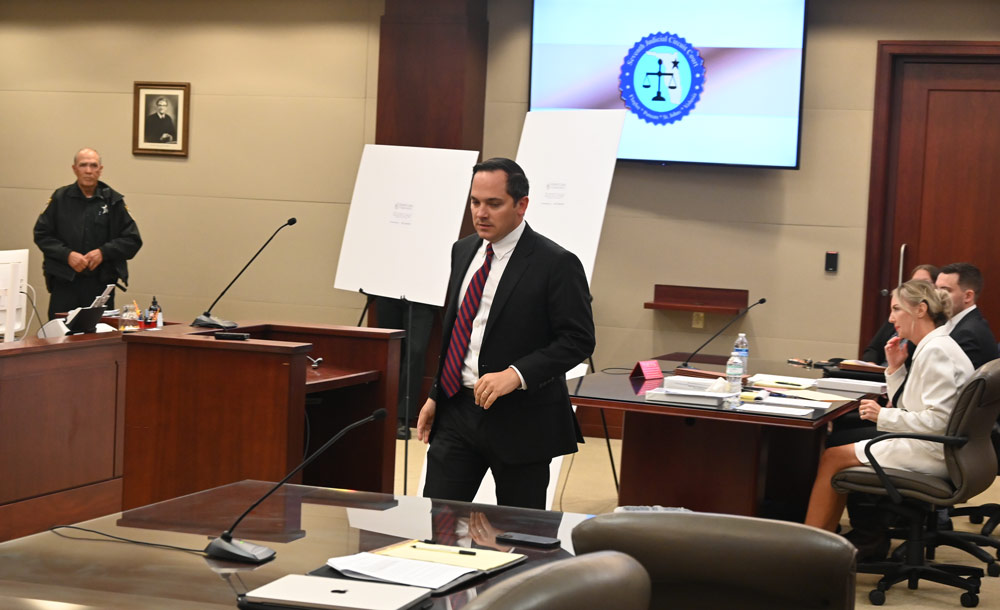Through his lawyer, Palm Coast Mayor Mike Norris filed a move Thursday for a rehearing of his lawsuit against the city and Council member Charles Gambaro. Despite a court decision to the contrary, Norris continues to maintain that Gambaro was appointed illegally.
Separately, Norris claimed in a combative social media post late Friday that the Florida Commission on Ethics had formally dismissed the case the City Council had brought against him because it lacked adequate legal standing. The post was full of mistakes and misrepresentations.
Although the two problems are unrelated, they both originate from the same political resentment that has characterized Norris’s presidency since his election in November. Despite being found guilty by an independent investigation of violating the charter, constantly acting aggressively, and creating a hostile environment at City Hall, Norris has conducted a one-man war against the council and the administration over unfounded allegations of corruption and charter violations.
Two weeks after the council censured him for his misbehavior and infractions, he filed a lawsuit against the city and complained to the Ethics Commission about them.
On July 3, Circuit Judge Chris France decided that Norris lacked the legal standing to file the claim. In accordance with the city charter, the council appointed Gambaro to the District 4 seat for the more than two years left in that term, even if he had standing. The nomination followed the resignation of Council member Cathy Heighter in August of last year. France claimed that because crucial election dates had passed, it would be logistically impossible to hold an election for the Nov. 5 seat.
The two-page application for rehearing makes the case that the judge ignored one legal path while relying too heavily on another, which is known by the Latin phrase quo warranto, or by what authority. France decided that the only people who may have had standing were the Attorney General or a contestant for the Disrict 4 seat. Norris wasn’t either. Half a dozen precedents were listed in the order. Sabatini supports the argument that the judge ought to have taken into account Norris’s standing under a separate section of Florida law, the Declaratory Judgment Act, by citing a precedent that dismissed a lawsuit over education spending rather than elections.
France will have to determine whether or not that constitutes a legal error. The move for a rehearing indicates that Norris is thinking about filing an appeal till then. A rehearing motion must come before such appeals. However, there is absolutely no merit to the claim, according to lawyer Theresa Pontieri, a member of the City Council.
The city is not required to submit a reply. It might. Following its designation under state law, it may also file a move for sanctions and attorneys’ fees, generally known as a 57.105 motion. If the court determines that a lawsuit was baseless or lacked proof, it may grant the motion. The council requested that Norris reimburse the city for the $30,000 it spent on his legal defense. “I wouldn’t,” he responded, adding that he didn’t mind if it cost the city $1 million. Within 21 days of the move for rehearing, the city’s motion would need to be submitted.
Usually, Norris uses deflections in response to criticism or failures. When he brought up the strange and as-yet-unsubstantiated, if defamatory, allegations of a quid pro quo involving a developer, he did so following the investigative report concerning his wrongdoing and his first censure vote. After France’s decision, he did so, claiming that the city attorneys had never informed him that he lacked the legal right to suit. After the Council’s second censure vote and its determination to request that the governor remove Norris, he seems to be doing it once more.
The Friday social media post regarding the Ethics Commission’s decision to dismiss the city’s complaint, in his opinion, served as the deflection.
There is no reason to believe that Norris is fabricating any of his previous falsehoods because the Ethics Commission probably determined that the Palm Coast complaint lacked legal competence. That will be verified on Wednesday when the panel makes public the judgments made at its secret session last Friday.
The Ethics Commission reviews complaints for legal sufficiency in a closed-door session at each meeting. The majority are thrown. Some have been given permission to be investigated. Only the following Wednesday, when orders are also issued concerning each complaint, are the commission’s decisions made public.
Those who file an ethical complaint and those who are the subject of one have the right to attend the secret session, as do plaintiffs, respondents, and their lawyers. He was able to determine that the city’s complaint against him was dismissed, albeit with some inaccuracy, because it seems that Norris or a Norris representative was present during the secret session.
In reference to Pontieri, Norris asserted that the Vice Mayor had filed the complaint. No, it wasn’t. The City Council submitted it jointly, and four people signed it, including Pointieri.
According to Norris, the complaint was dismissed for lack of legal standing. He was confusing the Ethics Commission’s goals with language in the lawsuit he lost. Every month, the commission makes it clear which complaints it will be reviewing. Every month, it makes decisions using the same wording: According to the commission, these reviews are based on firsthand knowledge or information other than hearsay and are restricted to jurisdictional issues and assessments of whether the complaint’s contents are sufficient to allege a violation of the Code of Ethics or other laws under the Commission’s purview. The Commission’s findings do not address the veracity of the claims stated in these complaints because no factual investigation is conducted prior to the assessments. (Addition of emphasis.)
The commission frequently dismisses concerns that might be legitimate but fall outside of its jurisdiction. There was always the question of where the council should file its complaint: the ethical Commission looks into cases where public officials violate the state’s ethical code, particularly when they abuse their position for personal gain or interfere with their private affairs. The lawsuit against Norris does not make any such claims, and Norris has never been accused of doing so.
Norris mentions a letter purportedly from the city council that was sent to Governor DeSantis in a last-ditch effort to overthrow a legitimately elected mayor in the same social media post. According to reports, the letter is not being distributed. Norris dissenting, the council decided 4-1 to have it drafted and signed by the four council members who approved.Last week, it was sent.
Norris claimed in the same post that over 60% of voters in Palm Coast chose me to fix this city, and I will not be intimidated or distracted by political games. Norris is lying about his election victory, which is a typical mistake made by elected officials. He received 31% of the vote in the primary, which sent him to the runoff, and 63% of the vote in his runoff against Cornelia Manfre.
But to use his formula, only 46 percent of voters in Palm Coast chose him. In other words, the 33,578 votes in his favor represent 46 percent of the 72,932 Palm Coast voters registered at the time of that election. He is not quite a majority mayor. But that s not unusual in Palm Coast history, and he s well ahead ofthe 5.7 percent of the electoratethat Jon Netts won in 2011 in his re-election.
Norris claimsthe letter to the governoris filled with misinformation and false claims, though the letter s claims are well documented. He says he will continue fighting every day to bring integrity, transparency and real leadership to our city. He has in fact, abandoned almost all his mayoral responsibilities, refusing to meet with city staff to be briefed on city issues, refusing to sit on all but one committee or advisory council where the city is represented, refusing to hold city-sponsored town halls (he is holding one at the VFW this evening and stressing that it is not sponsored by the city), refusing to hold any of the 100-some community meetings a year his predecessors held, and refusing to act as the mayor at ceremonial city occasions.







